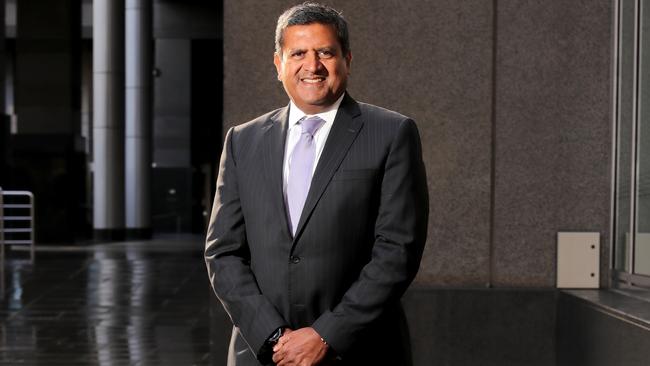CEO survey: Labor’s IR laws top list of concerns
The Albanese government’s new multi-employer bargaining laws have emerged as one of the single greatest concerns in The Australian’s 2022 CEO survey.

The impact of the Albanese government’s new multi-employer bargaining laws on productivity and international competitiveness has emerged as one of the single greatest concern among the country’s most powerful chief executives, The Australian’s 2022 CEO survey has revealed.
Having left a push against the changes – which passed parliament late last month – to business and employer groups, chief executives across sectors from resources to health have used this year’s survey to warn reforms will impede workplace flexibility and could lead to increased disruption.
The survey of the largest corporate players in the country, this year with 90 responses, highlights a range of concerns at the top of the business community from a lack of skilled migration to a precarious decarbonisation agenda.
The country’s largest businesses say they want to work with the government to address a skills shortage, an echo from last year’s survey where the issue was the standout risk to a recovery from the Covid-19 pandemic.
Despite Anthony Albanese’s plea to business that he does not want disagreement over the industrial relations bill to define the relationship between the government and the business community, the legislation and multi-employer bargaining are the themes that have most captured the country’s chief executives.
Newcrest Mining chief executive Sandeep Biswas said the changes contained significant risks for his sector.
“The government clearly stated ahead of the election that it planned to focus on lower-paid sectors,” Mr Biswas said. “Now, complex and highly detailed legislation has been rushed through parliament with inadequate consultation and communication.”
Lynas chief executive Amanda Lacaze, whose rare earths operation recorded a surge in profits in the last financial year, said it would be more difficult to have the same bonus schemes in place that allowed the benefits to be shared with its workers. “We all share a single interest which is the continued success of our business which enables continued high salaries to support our families,” Ms Lacaze said. “We work together to advance this … No other party shares this same goal.”
Even some of the largest banks expressed disquiet at the idea of multi-employer bargaining. “We feel each enterprise needs the flexibility to be able to negotiate with their people,” said Westpac chief executive Peter King, whose company last month completed a two-year enterprise bargaining agreement with staff endorsed by 78 per cent of those who voted.
AGL Energy chief executive Damien Nicks agreed that multi-employer bargaining could lead to inflated terms and conditions in some sectors, where the bargaining power of employees was already significant.
“This is without necessarily delivering the desired benefits in lower paid sectors,” Mr Nicks said.
Boral’s Vik Bansal called it a significant step away from enterprise-based bargaining which by definition was focused on the needs of the particular enterprise: employer and employees. “Multi-employer bargaining creates the risk of industry-wide strikes to drive up wages and conditions without any focus on productivity at the enterprise level,” Mr Bansal said.
Corporate leaders who have already publicly opposed the changes, including Qantas chief executive Alan Joyce and Wesfarmers managing director Rob Scott, have also doubled down on those criticisms. “Multi-employer bargaining is more likely to result in complexity and risk than benefits to productivity and wages,” Mr Scott said.
Labor struck a deal with independent senator David Pocock in late November that handed stronger protections for small and medium-sized businesses in return for the passage of significant changes to industrial relations laws.
The changes have been criticised by the Australian Chamber of Commerce and the Business Council.
The Australian Council of Trade Unions says the deal will instead give workers the ability to negotiate higher pay.
Not all businesses can be included in multi-employer pay deals, with small businesses having fewer than 20 employees not part of the change. Those with fewer than 50 employees are also given special rights.
BHP chief executive Mike Henry, who has previously raised concerns about the changes, told The Australian’s CEO survey that costs would increase without supporting productivity improvements, hurting Australia’s global competitiveness.
He said the changes did not reflect the government’s stated objective of addressing low wage growth in lower-paid sectors.
Mr Henry said that, in two decades in mining, nominal wages had doubled yet labour productivity had fallen by 8 per cent. “Recent changes to industrial relations legislation are not going to help this, and there is absolutely no case to be made for multi-employer bargaining in this sector,” Mr Henry said.
Among the resources sector’s chief concerns is that companies that have very different business models will be forced to take into account wage hikes secured at another workplace.
Woodside CEO Meg O’Neill said: “Any legislation that groups Woodside with other industry players that have differing business models, workforces and markets has the potential to negatively impact our global competitiveness.”
Business leaders said they supported the government’s aim to achieve wages growth for lower-paid sectors, but even those urging business to do more on equity see the legislation as a step backwards.







To join the conversation, please log in. Don't have an account? Register
Join the conversation, you are commenting as Logout